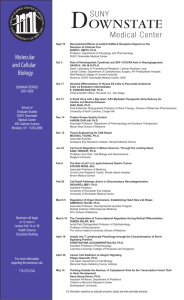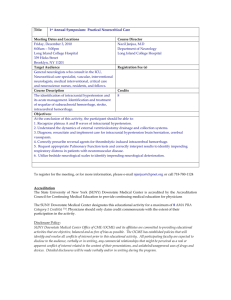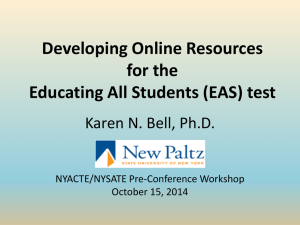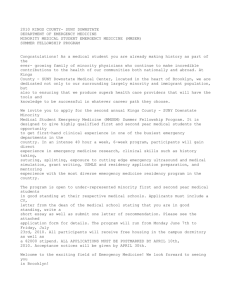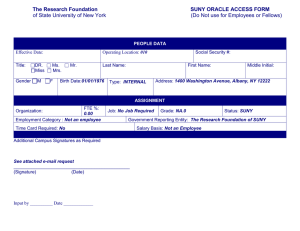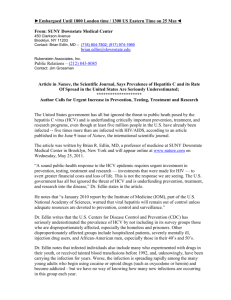SUNY DOWNSTATE MEDICAL CENTER UNIVERSITY HOSPITAL OF BROOKLYN POLICY AND PROCEDURE
advertisement
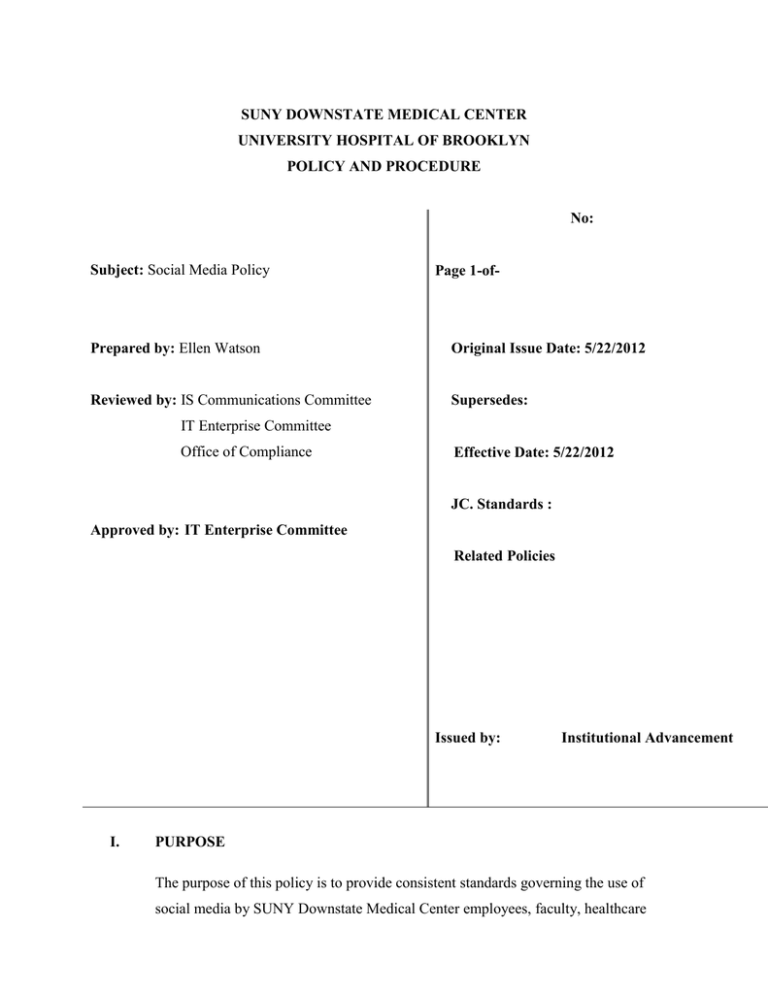
SUNY DOWNSTATE MEDICAL CENTER UNIVERSITY HOSPITAL OF BROOKLYN POLICY AND PROCEDURE No: Subject: Social Media Policy Page 1-of- Prepared by: Ellen Watson Original Issue Date: 5/22/2012 Reviewed by: IS Communications Committee Supersedes: IT Enterprise Committee Office of Compliance Effective Date: 5/22/2012 JC. Standards : Approved by: IT Enterprise Committee Related Policies Issued by: I. Institutional Advancement PURPOSE The purpose of this policy is to provide consistent standards governing the use of social media by SUNY Downstate Medical Center employees, faculty, healthcare 1 professionals, and students in support of Downstate’s mission, operational goals, and communication strategies. This policy applies to social sites hosted by SUNY Downstate, as well as nonDownstate sites and personal sites where the employee’s SUNY Downstate affiliation is known, identified, or presumed. This policy does not apply to content that is non-Downstate related. Social media activities that do not associate or identify faculty, staff, or students with SUNY Downstate, do not use SUNY Downstate email addresses, do not use SUNY Downstate identifiers such as the logo, do not discuss SUNY Downstate, and are purely about personal matters are not covered by this policy. These policies address but are not limited to: blogs, podcasts, discussion forums, and social networks including, but not limited to, Facebook, MySpace, Wikipedia, Twitter, LinkedIn, YouTube and Google groups. SUNY Downstate reserves the right to amend terms, conditions, policies and guidelines at any time to address the changing online world and revisions to the law. II. POLICY Social Media may be used by SUNY Downstate employees for business-related purposes, subject to the restrictions set forth in this policy, by an employee’s departmental supervisor, and by SUNY social media policy (included below; See “Section VI, Attachments”). These restrictions are intended to ensure compliance with regulatory, privacy, and confidentiality rules, and ensure best practices in social media use. Personnel may be authorized to use social media for many reasons, including for example, promoting a Department’s message, or engaging with peers or other healthcare leaders. Ww/c/personal/draftprolprd.,doc 2 University-hosted and approved sites include: 1) sites established by SUNY Downstate on Downstate-owned domains or on external domains on behalf of SUNY Downstate; 2) sites developed by Downstate departments and programs; and 3) sites on external domains that are approved for use or participation by University employees as part of their job description. A. Scope of this Policy This policy applies to all SUNY Downstate employees and faculty at all academic, research, and clinical sites. Students who use Downstate-supported social media sites should follow the guidelines outlined in this policy. In particular, HIPAA, FERPA, confidentiality, civility, research, and gross anatomy guidelines must be respected by all personnel. B. Authorization Institutional representation on social media sites must be authorized by SUNY Downstate’s Office of Institutional Advancement. Any sites that do not have formal authorization may be amended or removed. Sites established prior to issuance of this policy will be grandfathered in, but are still subject to this policy. C. Corporate Compliance 1. Compliance with laws, regulations, and policies: Information on SUNY Downstate social media sites must comply with local, state, and federal laws, as well as campus and SUNY policies. This includes HIPAA and FERPA regulations. For more information on the HIPAA requirements, please see Downstate’s HIPAA website located at www.downstate.edu/hipaa. 2. Compliance with copyright and intellectual property: Users must not violate copyright or trademark laws, or the intellectual property rights of another. Proprietary financial information must not be revealed. 3. Consent required: Content managers must have written consent to use recordings, photos, images, video, text, slideshow presentations, artwork, and advertisements, whether those rights are purchased or obtained without Ww/c/personal/draftprolprd.,doc 3 compensation. (This includes, for example, music used for background and downloaded news clips from broadcast and media sources. If you post content, photos or other media, you are acknowledging that you own or have the right to use these items.) 4. Civility: Content must not include any form of harassment, derogatory, or inflammatory remarks about an individual’s race, age, disability, relation, national origin, physical attributes, sexual preference or health condition; not include any unlawful, disruptive, threatening or profane remarks; must not invade another person’s privacy; must not impersonate any person or entity or falsely state or misrepresent an affiliation with a person or entity; and must not transmit any unsolicited/ unauthorized advertising, junk mail, spam or other forms of non- Downstate related solicitation. 5. Use of social media must be compliant with Downstate’s data protection safeguards: Faculty, staff, students, and departments using social media must not transmit any material that contains software viruses, worms or programs designed to interrupt computer software; or attempt to collect/ store information about third parties without their knowledge/ consent. 6. Liability for failing to comply: Any user who violates Downstate’s social media policy will be responsible for all liability and other claims resulting from such violation and shall indemnify and hold harmless SUNY Downstate and its member organizations from any costs or expenses that might be imposed upon Downstate or any of its officers, agents, or affiliates as a result of this violation. 7. No expectation of privacy: Downstate reserves the right to prohibit, restrict, block, suspend, terminate, delete or discontinue access to a Downstate- hosted/ approved site without notice and in its sole discretion. Downstate also maintains the right to reproduce, distribute, publish or create derivative works from content posted on Downstate hosted/ approved sites for any purpose. D. Privacy Ww/c/personal/draftprolprd.,doc 4 In online discussions or postings, employees shall not identify another employee, student, patient, visitor, or vendor by name without express written permission. 1. HIPAA. Employees must not use or disclose any patient health information (PHI) protected by the Health Insurance Portability and Accountability Act (HIPAA). PHI includes any individually identifiable information (oral, written, or electronic) about a patient’s physical or mental health, the receipt of health care, or payment for that care. In order to comply with HIPAA, social media sites must not be used when communicating about an issue involving a specific patient. Patient information may not be posted, even if it has been ‘de- identified’. It is often possible to identify patients even if their names or other identifying information are not included, particularly to the patients themselves and their friends or family members. Any employee who becomes aware of Downstate-related PHI posted on a social media site should inform his/her supervisor, the Office of Compliance & Audit Services or the Downstate Compliance Line (877-349-SUNY) of the breach. 2. FERPA. Employees must not use or disclose student information protected by the Family Educational Rights and Privacy Act (FERPA). Written permission is needed to release any information other than directory information about a student. In order to comply with FERPA, social media sites must not be used when communicating about an issue involving a specific student, applicant or alumni. Any employee who becomes aware of a FERPA violation is expected to inform his/her supervisor, the Office of Student Affairs, the Office of Compliance & Audit Services or the Downstate Compliance Line (877-349SUNY). 3. Photographs. Written permission (i.e. a release) from individuals whose images are identifiable must be obtained prior to posting the individual’s image on a social media site. Release forms can be downloaded from the Institutional Advancement webpage. Special care must be taken when dealing with images of “special populations” such as minors, patients, or research subjects. Assistance with releases, or answers to questions about exceptions to Ww/c/personal/draftprolprd.,doc 5 the requirement for a release, can be obtained from the Office of Institutional Advancement. E. Content Social Media sites often provide users the ability to voice their opinions and reactions to posted information. This may result in comments or feedback from users. Departments should not use this type of media if they are uncomfortable with the idea of users posting negative comments about the Department or Downstate, Department personnel, or Department programs. Comments posted over social media sites should be treated with the same respect and consideration provided to individuals who call or send letters to departments with suggestions, complaints, or praise. Departments sponsoring or engaging in social media sites must have protocols in place for responding to and forwarding posts as appropriate for resolution. Additional content guidelines include: 1. Timeliness. Departments approved to maintain social media sites on behalf of SUNY Downstate must keep their sites up-to-date and timely. 2. Promotion of services or products. The use of social media to promote Downstate products and services must be approved by SUNY Downstate’s Office of Institutional Advancement or its designees at Bay Ridge. SUNY Downstate-sponsored social media outlets may not be used to promote nonSUNY Downstate products or services. 3. Academic course content. Lecture content must have the written consent of the lecturer to be posted online. Any content used during the lecture -- slide, illustration, or book page, etc. – must be generated by the lecturer or have permission of the content author before it can be posted online. 4. Research content. Posting of research involving human subjects on social media sites must have written approval from the Institutional Review Board and Institutional Advancement. All HIPAA confidentiality requirements and Ww/c/personal/draftprolprd.,doc 6 the Common Rule regulations regarding research subjects must be respected. Research proposals submitted to the IRB, IRB board decisions, including requests for further information, and unpublished research data must not be posted online. Posting of research that involves animal subjects on social media sites must be approved in writing by the Office of Scientific Affairs, the Department of Lab Animal Resources, the researcher’s respective Dean’s office, and Institutional Advancement prior to posting. No photographs or videos of animals may be posted without authorization or approval. 5. Gross Anatomy Labs. Photos of cadavers or anatomic parts must not be posted online. Any reference to the Gross Anatomy labs in social media must be cleared with Institutional Advancement. F. Freedom of Information Law (FOIL) Departments and content owners using social media should be familiar with regulations regarding Freedom of Information Law (FOIL). Once information has been posted, it may be considered a public record subject to applicable retention requirements and to FOIL, under which government records are made available upon request to members of the public. Even if the communication, information, photo, video, etc. is immediately removed from the host site, once it has been featured on a social media site, it still may be subject to record retention requirements and to FOIL. The same would be true of third party comments or materials posted on a Department’s social media site. If a request for government documents is posted on a social media site, the agency should treat the request as a FOIL request, and forward it to Downstate’s FOIL officer. Ww/c/personal/draftprolprd.,doc 7 For further guidance on compliance, consult with Downstate’s FOIL officer. G. Linking to other sites. Social media sites should follow linking policies established for linking to and from Downstate’s website, as delineated in: http://www.downstate.edu/policy/, section III.D, as follows: I. III.D. LINKING POLICY SUNY Downstate’s website provides links to websites of various state, federal, and local government agencies and to websites of certain other organizations. SUNY Downstate does not provide links to private businesses unless a formal business partnership has been formed and/or the link is primarily educational in nature. In addition, SUNY Downstate does not link to any website that exhibits hate, bias or illegal discrimination. The following guidelines are utilized in evaluating a website for linking from a SUNY Downstate webpage: Is the external website an official Federal or State supported website? Does the external website provide official government information or services? Does the external website complement existing information, products, or services on the SUNY Downstate website? Is the external website accessible and applicable to a wide audience? Is the external website’s content relevant, useful, and authoritative? Does the external website’s information appear to be accurate and current? Is the external website’s approach to the privacy of personal information consistent with SUNY Downstate’s privacy and security policies? Is the external website “user-friendly?” The SUNY Downstate Webmaster, in consultation with the Office of Institutional Advancement as necessary, will review links from the SUNY Downstate web pages on a routine basis to ensure that they operate effectively, add value to SUNY Downstate, and are consistent with SUNY Downstate’s mission. SUNY Downstate will notify users when they are leaving its website, including a statement that such external sites do not necessarily operate under the same laws, regulations, or policies as SUNY Downstate, as follows: Ww/c/personal/draftprolprd.,doc 8 Disclaimer: The SUNY Downstate website includes links to information and sites created and maintained by other public or private organizations. SUNY Downstate provides these links solely for its users’ information and convenience. When users select a link to an external site, they are leaving the SUNY Downstate website and are subject to the privacy and security policies of the external sites. These sites do not necessarily operate under the same laws, regulations, or policies as SUNY Downstate. SUNY Downstate does not control or guarantee the accuracy, relevance, timeliness, or completeness of information on a linked website. SUNY Downstate does not endorse the organizations sponsoring linked websites and does not endorse the views they express or the products and services they offer. SUNY Downstate cannot authorize the use of copyrighted materials contained in linked websites and is not responsible for transmissions users receive from linked websites. III. DEFINITIONS A. Social Media - For the purpose of this policy, Social Media is defined as Internet or Mobile digital tools and systems used to share and/or receive information or conversation. Examples include but are not limited to: a. You Tube b. Facebook c. iTunes d. LinkedIn e. Twitter f. Blogs g. Social media content that is hosted internally and protected by SUNY Downstate ID/Password B. Content Owner - The individual assigned by a department as the individual responsible for monitoring and maintaining web content. This person, or his or her assignee, is also responsible for moderating comments and postings by internal and external users, including deleting comments and postings that violate Downstate’s social media policy. Ww/c/personal/draftprolprd.,doc 9 Content owners should have a clear understanding of Downstate’s social media policy, and their role should be clearly defined by their department. Departments must make sure that content owners know department goals, and posts should be in line and consistent with Department messaging goals and those of SUNY Downstate. Training should be provided for content owners authorized to engage in social media, and they should be aware of issues related to using social media. Departments must have a process for oversight of content owners, and a protocol for content owners to follow regarding responding to complaints or forwarding them to appropriate departments within the Downstate hierarchy. Institutional Advancement should be notified of all complaints (send cc to Ewatson@downstate.edu and Rnajman@downstate.edu). IV. RESPONSIBILITIES A. Institutional Advancement is responsible for approval of all social media sites and developing and implementing review processes. B. Departments approved to operate and maintain social media sites are responsible for updating and monitoring the content of their sites, as follows: 1. Content must be kept current and accurate. 2. Content Owners or their designees must monitor their sites on a daily basis, and delete postings that do not adhere to Downstate policies. Spam and off-topic comments must be deleted from the site. 3. Content Owners must respect copyrights and disclosures. Proprietary financial, intellectual property, patient care or similar sensitive or private content may not Ww/c/personal/draftprolprd.,doc 10 be revealed. Content must be in line with SUNY Downstate communication goals. 4. Content Owners are responsible for obtaining all required consents. 5. Content owners who are notified that they have posted incorrect information should correct mistakes promptly. V. PROCEDURES/ GUIDELINES A. Using or Participating in Downstate-hosted and Approved Sites All Downstate employees using or participating in social media shall observe the following: 1. Departments that plan to use a social media page should review their site and plan of action with Institutional Advancement and Biomedical Communications prior to launch. The review should include designation of a Content Owner. 2. Downstate-hosted and approved sites must focus on subjects related to Downstate and its mission, vision, and values, and comply with Downstate regulations, policies, and procedures, and state and federal laws. 3. Content on SUNY Downstate-approved or branded social media sites must not promote personal projects or endorse external organizations’ brands, causes, or opinions as a SUNY Downstate employee. 4. Employees must identify themselves by actual name and, when relevant, position, or role within Downstate when blogging or posting statements about Downstate-related matters. Ww/c/personal/draftprolprd.,doc 11 5. Posts and content should be written by the person whose name is presented as being the author (editing and proofing by a second person is acceptable.) If necessary or desirable that others become involved in the social medial initiative, they and their role should be identified publicly. 6. Employees may not announce Downstate news on a social media site unless pre-approved by the Office of Institutional Advancement. (Release of news about Downstate operations and activities to the media and the general public is the sole responsibility of Downstate’s Office of Institutional Advancement, or its designees at Downstate Bay Ridge.) Only individuals officially designated by Downstate have authority to speak on behalf of Downstate. After Downstate’s Office of Institutional Advancement has released information, content managers may post that information on a social media site. 7. Employees who see misrepresentations made about the University in the media or by other bloggers should alert the Office of Institutional Advancement and Biomedical Communications and should not attempt to engage directly with the media or other bloggers. 8. Employees should always use their best judgment when blogging and posting comments related to Downstate. When uncertain whether a proposed post is appropriate and in conformity with Downstate regulations, employees should discuss the proposed post with their supervisor, and/or Institutional Advancement before posting. Ultimately, however, employees are solely and individually responsible for what they choose to post to a blog or express online. Some points to consider include: a. Does the proposed post promote my role as a Downstate member? b. Does the proposed post reflect positively on my co- workers/ colleagues? c. Does the proposed post conflict with Downstate’s mission, culture or values? Ww/c/personal/draftprolprd.,doc 12 d. Does the proposed post reveal confidential student, patient, research or proprietary information? e. Does the proposed post include any information that could directly or indirectly identify a patient under Downstate’s care? 9. Employees must respect State time and property. Use of computers, networks and work time are subject to specific rules. In general, computers may be used for incidental and necessary non- work purposes, in limited amount and duration, which do not interfere with the employee’s Downstate duties. State resources may not be used to support, promote or solicit lobbying or political activities. 10. Departments engaging in social media should clearly brand their sites as an official Downstate site, using the Downstate logo as an identifier. Certain Department initiatives may require a non-branded social media site. Departments interested in launching issue-specific or non-branded sites should contact the Office of Institutional Advancement. Social media sites may not use the official Downstate logo without the approval of the Office of Institutional Advancement. For physicians and healthcare-related professionals, additional guidelines apply: 1. Do not give medical advice using social media. Let individuals with health inquiries know the importance of online health privacy and the legal implications to you. 2. Limit contact with patients or potential patients who reach out to you via Facebook, Twitter or other social media avenues. Remember, on social networking sites, there is no clear line between your work life and your personal life. Even if you block open access to your site there is no guarantee personal information will be kept confidential. Ww/c/personal/draftprolprd.,doc 13 3. Document any patient contact. Any attempt a patient makes to discuss clinical matters via a social media platform should be documented in the patient’s medical record. 4. It is important to note that all data transmitted via social networking/media website servers leaves a digital trail that can be traced back to its author. For Students: 1. While these guidelines apply to employees and not expressly to students, students who use Downstate-supported social media sites should follow the guidelines outlined in this policy. In particular, the guidelines delineated in Sections II.C., D. and E. must be respected. B. Using or Participating in Sites that are not Downstate-hosted or approved: When using social media that is not University-hosted or approved, whether at work or away from work, if the employee’s Downstate affiliation is identified, known, or presumed: 1. Employees may identify themselves as a Downstate employee, but should not represent that they are communicating the views of Downstate, or do anything that might reasonably create the impression that they are communicating on behalf of, or as a representative of, Downstate. 2. Employees should use a disclaimer when publishing a blog, posting a comment, or sharing an image on a non-Downstate hosted or approved site if it has something to do with work done at Downstate. Whether publishing a blog or participating in someone else’s, employees should make it clear that what they say is representative of their views and opinions and not necessarily the views and opinions of Downstate. At a minimum, employees should include the following standard legal disclaimer language: Ww/c/personal/draftprolprd.,doc 14 DISCLAIMER: The postings on this site are my own and do not represent the views, positions, or opinions of SUNY Downstate Medical Center. (Note: This standard disclaimer does not by itself exempt University employees from responsibility when blogging. Employees should consider whether personal thoughts they publish may be misunderstood as expressing Downstate positions. Supervisors should assume that employees and administration will read what is written. A personal blog or social media site is not the forum to communicate Downstate policies to employees or to conduct Downstate business. They are not forums in which clinical staff should provide clinical advice or opinions.) 3. Even when made in the confines of private blogs or chat rooms, Downstate employees are urged to treat Downstate, their fellow employees, students, patients, visitors, and vendors with respect in communications and statements. 4. Even when using or participating in non-Downstate hosted or approved sites, employees should refrain from posting material that is obscene, defamatory, profane, libelous, threatening, harassing, abusive, inappropriate, confidential, or embarrassing to Downstate, fellow employees, students, patients, visitors, or vendors. 5. Employees shall not create social media sites or web pages that give the appearance of official Downstate-hosted or approved sites, or that give the appearance of representing Downstate in an official capacity. Using Downstate’ official logos, graphics, or images on personal social media sites is strictly prohibited. Likewise, significant use of Downstate-related content creates an appearance that the site is Downstate-hosted or approved, and is also prohibited. VI. Enforcement Ww/c/personal/draftprolprd.,doc 15 SUNY Downstate Medical Center considers any violation of this policy and procedures to be a serious offense that can be the basis for the loss of network access and/or other disciplinary actions. Violation of this policy may result in: 1. Limitation or revocation of right to use or participate in University-hosted or approved social media. a. Corrective actions or sanctions, up to and including termination; referring the violation to the appropriate state or federal agency; and civil or criminal liability. VI. ATTACHMENTS: State University of New York System Administration Social Media Policy The State University of New York encourages the appropriate use of social media as a method for communicating ideas and information, and as part of the educational mission of the State University and its campuses. This policy governs employees of the State University of New York System Administration. This policy governs behavior of individuals as they utilize a variety of Social Media technologies and is not limited to any specific media format. Social Media Defined: For the purpose of this policy, Social Media is defined as Internet or Mobile digital tools and systems used to share and/or receive information or conversation. Personal Use of Social Media on Personal Time: Personal use of Social Media on personal time is not governed by this policy, however individuals may not make statements or take actions at any time on Social Media that violate applicable law or SUNY policy. Violating actions or statements over Social Media with a nexus to State employment may be governed by SUNY policy. Ww/c/personal/draftprolprd.,doc 16 Personal Use of Social Media on State time: Personal use of Social Media on State time is governed by the New York State Public Officers Law and other Federal, State and Local laws; the State University of New York Acceptable Use Policy as issued by the Office of Administrative Systems; and SUNY Human Resources policies. Official Use of Social Media: Unless specifically authorized by the Office of Communications, no SUNY System Administration employee may create an “official” SUNY presence on any form of Social Media, now in existence, or created in the future, or represent themselves as a spokesperson or authorized representative of the State University of New York. Some employees of SUNY System Administration may be required to use Social Media as part of their employment responsibilities. If so, such status will be clearly stated in an employee’s work responsibilities, and will be approved in advance by the Office of Communications. The Office of Communications and other System Administration offices designated by the Office of Communications may utilize Social Media to present information and content to the public and receive feedback from the public and the SUNY community. Content and information released on Social Media is equivalent to content and information released to the press and the public in any other format, including press release, letter to the media, open letter to the public, etc. Care must be taken that content and information released to the public over Social Media is accurate, does not violate applicable laws (including, but not limited to, copyright, trademark and defamation law) or SUNY policy. Official SUNY Social Media may allow members of the public to comment or react to posted content and information. Individuals, including employees of SUNY System Administration acting in their personal capacity, may post or comment anonymously or identifiably. Ww/c/personal/draftprolprd.,doc 17 In general, SUNY invites discussion of important ideas and issues through Social Media. However, SUNY reserves the right to remove posts or comments that are obscene, defamatory, offensive, contain threats of violence, abusive, spam or advertising, or unrelated to the content or information. SUNY also reserves the right to remove posts or comments that violate applicable laws including, but not limited to, copyright and trademark, or those that violate the use policies promulgated by the applicable Social Media provider. SUNY use of Social Media is governed by Section 230 of the Communications Decency Act, which provides a safe harbor for Internet Service Providers and Web sites for activity that takes place on said sites, provided that the site or domain takes certain actions when legally required. Amendment and Questions: This policy is maintained by the Office of Communications. It may be amended from time to time by the Office of Communications in consultation with other appropriate officials. Questions may be directed to the Office of Communications at communications@suny.edu or 518-320-1311. VII. REFERENCES: See Downstate’s web policy, at http://www.downstate.edu/policy/ Date Revision Required Reviewed 5/22/2012 Responsible Staff Name and Title (Circle One) Yes No Yes No Yes No Yes No Ww/c/personal/draftprolprd.,doc Ellen Watson, Institutional Advancement 18 Ww/c/personal/draftprolprd.,doc
